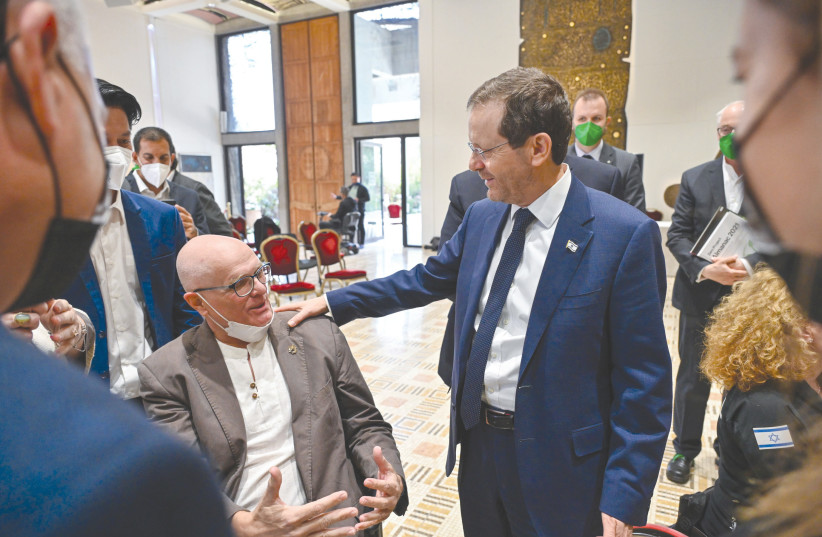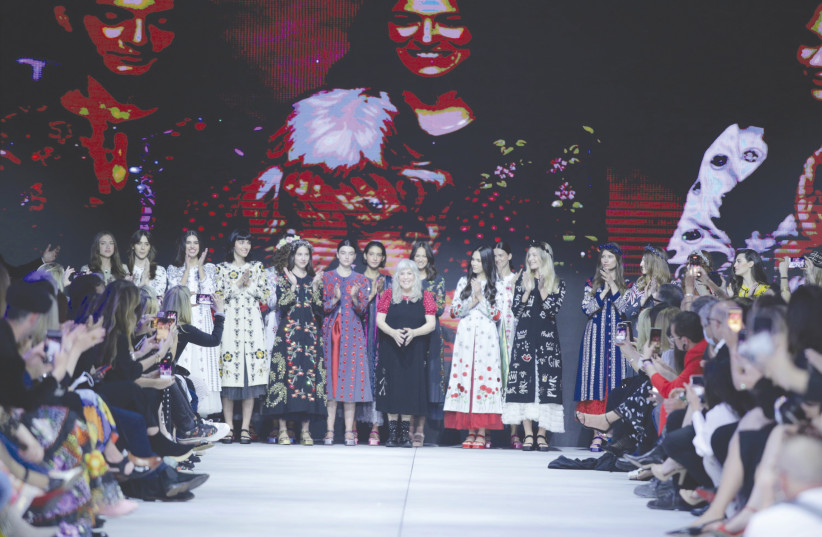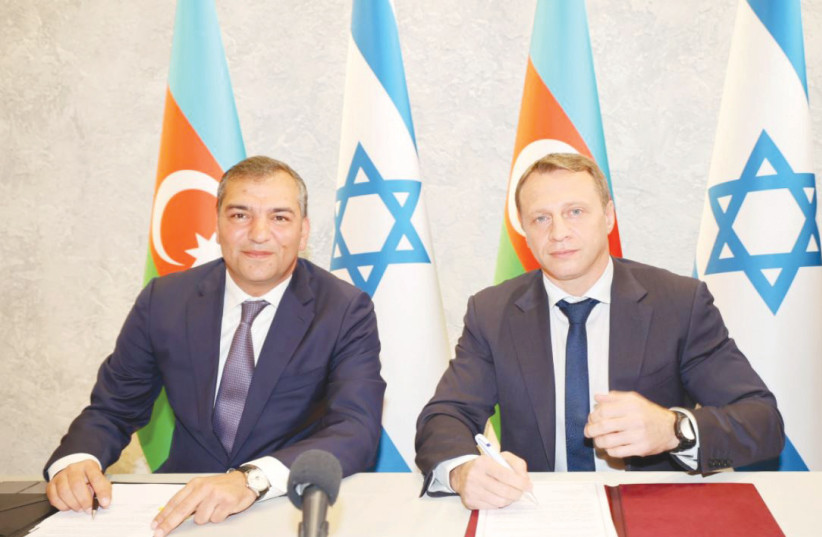Way back in 1963, popular singer Bob Dylan wrote “The times they are a-changin’.” Indeed, they are, and not only in this part of the world. Russia’s destructive invasion of Ukraine is dominating news stories in media outlets worldwide. Here, on the local scene, the condemnations by Palestinian Authority President Mahmoud Abbas, Jordan’s King Abdullah II and Turkey’s President Recep Tayyip Erdogan of terrorist attacks against Israelis are something that few Israelis ever thought to hear.
Terrorism also has a negative effect on tourism, but that did not mar the success last week of the International Mediterranean Tourism Market in Tel Aviv, the establishment of the office of the Azerbaijan Tourism Board in Israel, the upcoming official inauguration later this month of the Slovak Institute in Jerusalem that will be attended by Prime Minister Naftali Bennett and Slovakian Foreign Minister Ivan Korcok, and, on the diplomatic front, the forthcoming opening of an embassy in Tel Aviv by the island state of Singapore, which was announced last month in Jerusalem by Singapore’s Foreign Minister Vivian Balakrishnan, when he met with Foreign Minister Yair Lapid.
Also still to come is the inauguration of the Embassy of Bahrain, once the ambassador, who has been in Israel for several months, finds a suitable location.
■ LAST WEEK Fuad Naghiyev, chairman of the State Tourism Agency of the Republic of Azerbaijan, and Tourism Minister and chairman of the Israel-Azerbaijan Joint Committee Yoel Razvozov announced the opening of the official Azerbaijan representative office at Herbert Samuel Dock on the Tel Aviv seafront.
In congratulating his colleague, Razvozov said: “Azerbaijan is a strategic partner and a true friend of Israel. Our relations are based on mutual trust and respect.

“Inaugurating the Tourism Office of Azerbaijan in Israel today is another important milestone in our relations on the way to opening the Embassy of Azerbaijan in Israel in the near future. Now, when almost all the restrictions on incoming tourism to Israel were lifted, we look forward to enhancing our cooperation and welcoming tourists from Azerbaijan.”
He noted that the event was very symbolic in that it was taking place a week before the 30th anniversary of the establishment of diplomatic relations between Israel and Azerbaijan.
Razvozov added that he looks forward to personally conveying a message of appreciation to the government of Azerbaijan on behalf of the government of Israel, during his forthcoming visit to what he called “this beautiful country.”

Naghiyev stated that friendly and cooperative bilateral ties between Azerbaijan and Israel are developing yearly, not only in economic and strategic terms, but also through historic cultural connections. Mutual friendship and understanding played an important role in the establishment of these ties, he said, underscoring that Azerbaijanis and Jews have lived together for centuries, upholding the same values.
“The opening of the Tel Aviv office of the tourism representative of the Republic of Azerbaijan is a very important event for us,” he continued. “We believe our joint desire will contribute to further boosting friendship and tourism cooperation between our countries.”
Florian Sengstschmid, CEO of the Azerbaijan Tourism Board, commented that the office will serve to establish fruitful collaborations between the counterparts of the two countries, while increasing awareness about Azerbaijan.
Airlines are currently resuming their direct three-hour flights to Baku, he said. Before COVID there was a marked increase in Israeli tourism to Azerbaijan. In round figures, 47,000 Israelis visited the country in 2019, representing a 17.3 % increase compared to 2018.
■ THERE’S A strong likelihood that Slovak Ambassador Igor Mauks will be spending more time in Jerusalem in the future than he did in the past. The reason is the Slovak Institute, which has been operating for some time on the capital’s King David Street, but which will be officially inaugurated this month.

Last week Mauks opened a workshop for Israeli tour operators and media on the premises of the institute aimed at presenting the Trnava region.
The event was organized by the Regional Tourism Organization of Trnava Self-Governing Region in cooperation with Piestany Airport and Ensana Health Spa Hotels.
The workshop was the first to be opened at the Slovak Institute, which is not just a space for the presentation of art, but a multifunctional space that can also be used to present Slovakia as an attractive travel destination, said the institute’s director, Jakob Urik.
“Before the pandemic, several thousand Israeli tourists visited Slovakia each year. I believe that with the presentation of the Trnava self-governing region in Israel, we will restart tourism among our countries. I am glad that the Slovak Institute in Jerusalem can be a part of that,” said Urik.
The Slovak Institute is a cultural facility curated by the Ján Koniark Gallery in Trnava.
■ ALTHOUGH HE spent the major part of his life in Tel Aviv, Yossi Banai will always be regarded as a native son of Jerusalem. Indeed, he often returned, and many of his songs and skits centered on the Jerusalem of his youth. A singer, songwriter, actor, producer, writer of comedy skits and more, the multitalented Banai, who died of cancer in May 2006, was born on April 13, 1932.
In honor of what would be his 90th birthday, the Jerusalem Symphony Orchestra will, on Thursday, April 7, hold a Yossi Banai tribute concert at the Henry Crown Auditorium in the Jerusalem Theater complex, with singers Keren Hadar and Eli Gorenstein performing some of Banai’s best-known songs, including “I and Simon and Little Mois,” which symbolizes the friendship of his youth while growing up in the Mahaneh Yehuda market.
■ NEARLY THREE years have passed since the Beit Lessin Theater moved into its permanent home on the corner of Dizengoff and Frishman streets in Tel Aviv. The move might not have been possible without the generosity of Baruch Ivcher, an Israeli-born businessman who lives in Peru and has major investments in the communications industry.
The theater is just one of the examples of his generosity where Israel is concerned, but this may not have come about were it not for his long friendship with Rani and Hila Rahav, in whose public relations firm he is a partner.
Hila Rahav happens to chair the Friends of Beit Lessin, and when the theater was in a deep economic crisis, she turned to Ivcher, who understood the importance of supporting the theater, and came to its rescue. His name has since been added to its name, but a formal inauguration could not take place during the pandemic.
The long-delayed inauguration ceremony last week was attended by Tel Aviv Mayor Ron Huldai and his wife, Yael, long-term Beit Lessin director Tzipi Pines, Ivcher and members of his family, Rahav, and Dr. Hila Oren, CEO of the Tel Aviv Foundation. Ivcher, who has seen a thing or two in his life, said that it was emotionally moving to see the theater living and breathing and presenting the best Israeli productions.
Among theater patrons who came to celebrate with Ivcher were retired judges Michal Rubinstein and Hayuta Cohen, Prof. Uriel Reichman founder and president of Reichman University, film producers Pnina and Moshe Edery, Ofer Nimrodi and Raziella Gershom.
■ NOW THAT women have not only cracked the glass ceiling but have well and truly broken it, and can be seen in top executive positions in law, medicine, business, journalism, politics, diplomacy and many other fields, the reflection of these achievements can be seen on fashion runways around the world, including Fashion Week, which was held in recent days at Hangar 11, Tel Aviv Port.
While women were struggling to prove their abilities, the general fashion trend was toward pantsuits, which conveyed a mannish, businesslike appearance. But now fashions are more feminine, more elegant and, dare one say it, more flattering.
Kudos must go to preeminent fashion show producer Motty Reif, who just over a decade ago revived Israel Fashion Week, and has managed to keep it going, through sponsorships such as Kornit Digital.
Aware that women of all ages are drawn to fashion, Reif includes former Israeli supermodels, who age-wise are past their primes but have not forgotten how to strut the catwalks. He did so again this week.
In addition, he keeps his finger on the pulse of international development, and thus the Abraham Accords radiated from the presence of Dr. Mona Al Mansouri, considered to be the top designer of the United Arab Emirates. And there was more than a hint of Middle East fashion in the dress worn by Michal Herzog and in the embroidered and exquisitely printed frock coats worn over long dresses designed by Tovale Chasin, who received a life achievement award for her uniqueness and resilience when so many other former fashion industry icons have fallen by the wayside.
Al Mansouri, who was the guest of honor, produced a magnificent collection of gorgeous wedding and evening gowns and received a standing ovation, which was emotionally moving for her. It has to be remembered that Israel’s developing relations in Arab states also have to penetrate a decades-long mindset of animosity and negative narratives. Despite having an international reputation as a great designer, Al Mansouri was not sure how she would be received in Israel. Now, she’ll be much more confident in coming back.
■ ISRAEL’S SEVENTH president, Ezer Weizman, as a former commander of the Israel Air Force, maintained contact with all the men who had served with him or under his command.
One such person was former combat pilot Yuval Wagner, who in 1987 was injured in a helicopter crash which left him paralyzed and restricted to a wheelchair. Because he had lost the use of his legs, many places were inaccessible to him. Weizman may have become more aware of the accessibility problem when, as defense minister, he himself was temporarily confined to a wheelchair after breaking a leg. By the time he was president, Wagner had already mounted a campaign to alert the public to the difficulties of accessibility.
As Wagner tells it in a documentary about the presidents of Israel, Weizman telephoned him one day and urged him to start an organization that would make venues throughout the country more accessible. The launch was celebrated in 1999 at the President’s Residence, where Wagner has since met with each of Israel’s presidents.
He was back again this week with participants in the Global Accessibility and Inclusion Leaders’ Summit, which was taking place in Israel for the first time.
Delegates from numerous countries held workshops to define accessibility and inclusion targets for people with disabilities for the year 2030. Physical and mental disabilities should not be an impediment to the development of natural potential. The late physicist and cosmologist Stephen Hawking was a prime example.
But President Isaac Herzog went much further back in history, citing biblical figures. Moses was a stutterer, and Jacob had a limp after wrestling with an angel, he said. “I think the Bible tells us our leaders had disabilities, and we must understand that people with disabilities are equal to everybody else.”
He added that he was inspired by the fact that the President’s Residence “gave you the charter to move on to change the world. I give you this charter again on our behalf to go on and conquer the world. We will support you in whatever way we can.”
Michal Herzog added: “I think, for Israeli kids, when they see you as role models, it’s a natural thing to admire you, and to look up to you. That’s the key. That’s the key for kids to feel that this is in their DNA, [that] it’s a natural thing.”
Wagner recalled that, as a legislator, Herzog had promoted the issue of accessibility in Israel in the Knesset, and had afterward continued to do so.
■ AUSTRALIANS, BOTH Jews and non-Jews, have had a strong connection to Beersheba for more than a hundred years. There are several Australian projects in Beersheba and elsewhere in the Negev, including the ANZAC Museum. Australian soldiers who fell in battle during the First World War are buried in the Commonwealth War Graves Cemetery in Beersheba.
Australian Ambassador Paul Griffiths has been to Beersheba several times, but last week it was not to revisit the past but to look at the present and, in a sense, the future. He paid his first visit to Ben-Gurion University of the Negev.
“There is a dynamism in Israel and at BGU. A readiness to take risks and to be creative. They look to solve global problems, not just local ones. There are a lot of synergies here with Australian interests,” Griffiths said after the visit.
He was particularly interested in the continued massive growth of investment in Israel. “Twenty-six billion dollars was invested in Israel’s technology ecosystem last year. The technology solutions being generated here present lots of opportunities for the Australian public and private sector,” he enthused.
At the same time, he noted, “Australian universities contribute significantly to global innovation, and our education builds world-leading talent. Combining this with Israel’s ability to commercialize academic research presents enormous potential.” He promised to explore joint research and development.
BGU President Prof. Daniel Chamovitz explained the unique academia-government-IDF-hospital-industry ecosystem that is emerging, which will eventually become an innovation district.
Addressing the entrepreneurial spirit that infuses BGU, Chamovitz said: “Tech transfer is undergoing a revolution. BGU is developing a new paradigm in commercializing the innovations stemming from our research. We are proud that a third of Israel’s engineers are graduates of our university – further testimony of our focus on the significance of academia and industry collaboration. BGU is a strategic partner in the Advanced Technologies Park adjacent to the university because we want to create jobs for our graduates in the South, where the future of Israel lies.”
Griffiths commented: “It’s amazing what they have accomplished in just 50 years.” He praised the university’s focus on global issues and its surging prominence in several fields, including cybersecurity and drylands agriculture – two of the world’s pressing problems.
Griffiths was also given briefings by experts about BGU’s strengths in cybersecurity and its agriculture and biotechnology research, where he learned about how the university tackles real world problems by partnering with multinational companies and international thought leaders, from tissue engineering and 3D printing technologies to training global MNCs on the hacker mindset.
He noted the similarities between Australia’s drylands environment and the Negev, and was intrigued by how BGU’s researchers are developing innovative solutions to allow sustainable dryland agriculture and efficient water use.
“Entrepreneurship is a state of mind, a way of thinking,” Chamovitz told Griffiths. “We are moving the university toward company and start-up building, better preparing the leaders of tomorrow, beginning with our first-class entrepreneurship center and student-led venture capital firm.”
Griffiths knows something of this from personal experience. Before his current role, he took time out from the foreign service to work in the private sector.
■ TO THOSE who may wonder whether the famed Katmandu Seder hosted by Chabad emissaries Rabbi Chezky and Chani Lifshitz will take place this year, the answer is yes. In a moving postcard that Chani Lifshitz sent to religious television and print media journalist and lecturer Sivan Rahav-Meir, she wrote that Chabad House in Katmandu has been reopened, and that they are now preparing for the Seder, not knowing how many people will show up.
She also included references to people who have been there before, saying that everyone has a story that should be told, and proposed that people sitting at Seder tables around the world be urged to tell their stories.
Aside from celebrating the exodus from Egypt and commemorating the Warsaw Ghetto Uprising, the month of Nisan has special connotations for Chabadniks, in that the last Lubavitcher rebbe, Rabbi Menachem Mendel Schneerson, was born 120 years ago on the 11th day of Nisan, corresponding in that year to April 5.
President Herzog this week welcomed a large delegation of representatives of the Chabad Rabbinical Court as well as Chabad emissaries from around Israel and abroad, and told them how impressed he is by the impact that Chabad has on the Jewish world, in terms of Jewish education, religious observance and simply doing good.
Many Chabad emissaries are conducting community Seders in the places where they live, in order to try to ensure that as many Jews as possible can celebrate the festival in the proper manner, in the company of fellow Jews.
In Jerusalem, Rabbi Yisroel Goldberg and his wife, Shoshi, Chabad directors of Rehavia and Nahlaot, will host a community Seder at Heichal Shlomo, which is conveniently a couple of doors away from Chabad of Rehavia, where a holiday service will be held prior to the Seder. There are more than half a dozen nearby synagogues for people who prefer to pray elsewhere. Wednesday night, April 6, is the final opportunity to make reservations. Call (02) 800-1717 or email Office@JerusalemChabad.Org
■ THE LONG arm of coincidence is once again at work. On the day after Hungarians moved politically to the Right and reelected Viktor Orban as their prime minister, giving him a landslide victory and seven seats to Our Homeland, a far-right nationalist party, which is to the closest thing that Hungary has to a Nazi Party, the Hungarian Embassy in Tel Aviv issued invitations for the screening this month at the Tel Aviv Cinematheque of a documentary about László Ocskay, who saved many Jews during the Holocaust and is billed as the Hungarian Schindler.
The event is being held in conjunction with the Ephraim Kishon Association, and will include a roundtable discussion following the screening. It should be remembered that internationally best-selling author and filmmaker Kishon was a Hungarian Holocaust survivor.
greerfc@gmail.com
